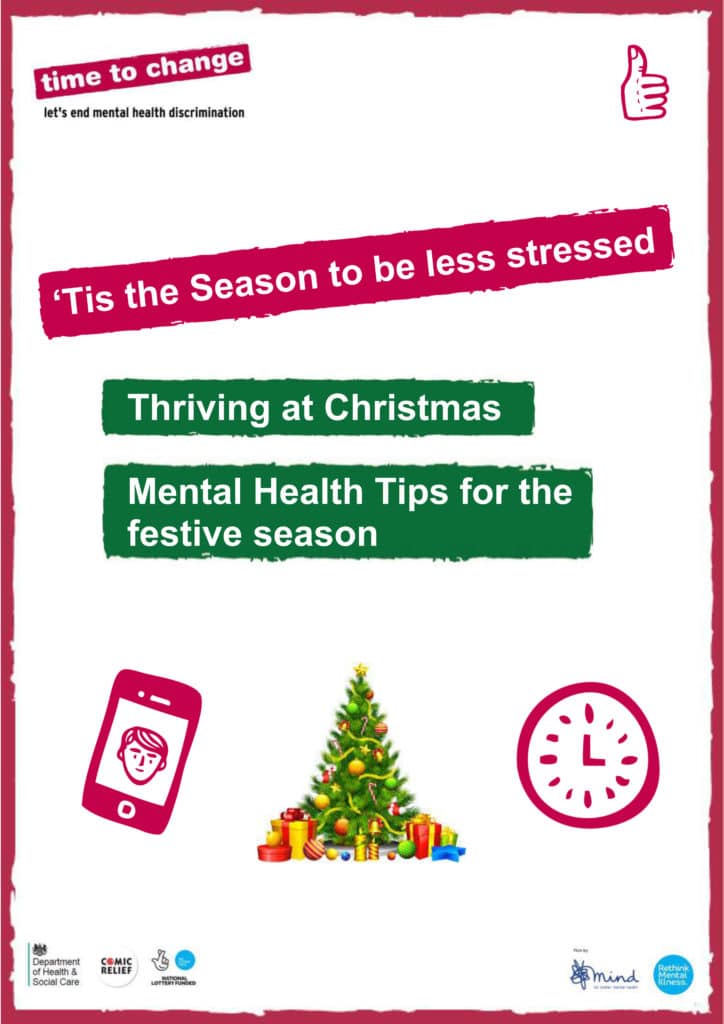Wellbeing at Christmas


cavamh wishes everyone a safe and healthy Christmas season. Christmas can be a testing time mentally, emotionally, physically and financially for many people. With the extra pressure that the festive season can bring, our worries and fears may seem worse this time of year. We have put together some links which we hope will be useful.

Christmas and mental health
MIND explains how the period around Christmas and New Year might affect your mental health. Gives tips on how to cope and suggestions for supporting someone else.
Whether or not Christmas is part of your life, your mental health might be affected by it happening around you. It’s a time of year that often puts extra pressure on us, and can affect our mental health in lots of different ways.
For example, if you:
- Feel alone or left out because everyone else seems happy when you’re not
- Wish you didn’t have to deal with Christmas, or find it stressful because of other events in your life
- Feel frustrated by other people’s views of a ‘perfect’ Christmas, if these feel different to your experiences
- Have ideas about what Christmas should be like, feel as if we need to enjoy it or worry something will ruin it
- Feel like Christmas gives you something to focus on and look forward to, and find it difficult when it’s over
- Want to celebrate with someone who’s struggling
Christmas and mental health tips and information


12 Tips of Xmas
1. Maintain a routine – It can be harder to wake up and stick to your routine during winter due to the dark mornings and feeling cosy under your duvet. Try your best to stick to a regular routine especially if you’re still working from home.
2. Make a list, check it twice – Create your own Christmas agenda to make sure that you balance your social commitments and self-care. Make sure you have outlined your boundaries and think about what will make you happy this year. Make time to do something you enjoy like watching a film or reading a book and set short-term realistic expectations. Do you usually have access to a mental health service which closes over the Christmas period? Ensure you have a plan in place in case you need help.
3. Help the community – Get involved by volunteering or donating gifts and food to help spread the Christmas joy. Organisations such as Salvation Army and Crisis support thousands of homeless individuals and need help providing food, gifts and emotional support. You can even help your local food bank.
4. Selfcare – Having a time-out helps to prevent stress and maintain performance throughout the day. It is essential for us to take a break whether it be from work, family, friends or Christmas to make sure we don’t start to feel overwhelmed. Self-compassion is good for your mental health, it’s ok to be kind to yourself and give you a treat from you.
5. Create a Christmas playlist – Studies show that music releases dopamine (the feel-good chemical in our brain). Listening to music can reduce depression and stress, boost our mood, help us to sleep better, as well as improve our motivation and memory.
6. Make time for sleep – Sleep is an essential component to not only positive mental health but also our physical health. Make sure it is still a top priority, remember tip 1! To read more about the importance of sleep click here.
7. Avoid unhealthy comparisons and expectations – It is easy to get carried away with what everyone else is doing (or buying!). Avoid unhealthy comparisons, this year it may be tempting to overcompensate as things will be different, but it’s important to manage your money and gift giving, you can find free advice if you are struggling here.
8. Pull out your chef hat and apron – Cooking is a good way to boost our creativity and leaves us feeling a sense of accomplishment once we complete the dish! What we eat can impact how we feel so make sure to enjoy festive food and drink in moderation. Over-indulging can make us feel sluggish and sometimes maybe a little bit guilty! Try this recipe for gingerbread people.
9. Connect with others – Spend time with your family and friends, close and positive relationships help us to feel like we have a purpose and sense of belonging. COVID-19 may make it more difficult for us to see our loved ones, but with the power of technology we can stay connected. If you are struggling it is important to talk to someone about how you are feeling. If you need someone to talk to at any time of the day, you can call Samaritans for free on 116 123.
10. Winter walk – A winter walk is a nice way to boost your mood as well as getting in some daily exercise. Walking is the easiest way to incorporate exercise into your daily routine and is good for our mental and physical health.
11. Make decorations – Arts and crafts can help reduce anxiety and depression and has a positive impact on our mental health. It is also a great way to make Christmas decorations. Try some at home DIY Christmas decorations this year, click here for some inspiration.
12. Have mindful moments – Paying attention to the present can improve our mental wellbeing. Mindfulness helps us reconnect with ourselves and connects us to our thoughts and feelings. Take time each day to think of the positive aspects of your life. Meditation, mindfulness apps such as ‘CALM’, yoga and breathing exercises can all be used for relaxation and reconnecting to the present moment.
Mental health is never straight forward, and our mental health problems don’t just go away for Christmas, for some people Christmas time can even be a trigger, but we can try to maintain an element of control at times when we feel overwhelmed and emotional.
We hope you have a lovely Christmas and remember there are still support services open over the festive period, please reach out if you are struggling.

Mental Health UK

Christmas can be a testing time mentally, emotionally, physically and financially for many people. This year a great number of us are feeling the fatigue and pressure brought on by the cost-of-living crisis, the climate emergency, the war in Ukraine and other challenges. It’s okay if you’re not feeling full of joy during the festive season. We’re here to help you with your mental health.
https://mentalhealth-uk.org/christmas-and-your-mental-health/


Thriving at Christmas

Christmas is a great time to ramp up your self- care whilst also raising awareness with family, friends and colleagues. We should all prioritise our mental health and wellbeing over the festive period. Time to change have some tips and guides in the attached pdf to help you structure your plan around self care and wellbeing so that your mental health is maintained and managed allowing you the freedom to live your life.

Samaritans
With the extra pressure that the festive season can bring, our worries and fears may seem worse this time of year. It’s important you check in on yourself and look after your wellbeing.
No matter how or if you celebrate, it is normal that this time of year can affect your mental health. You may be feeling like you aren’t enjoying the things you usually do this time of year. You may be worried about friends and family or other things happening in the world. You are not alone. There are all sorts of reasons you might find this time of year difficult and that’s OK.
At Samaritans, we’re committed to helping you, however we can. If you don’t feel like there’s anyone you can talk to, our volunteers are here for you. Call free, day or night, on 116 123 or email jo@samaritans.org.
In case it’s helpful, we have gathered some tips and resources to help you cope this festive season.

Relax with Festive Baking!
Perhaps you enjoy spending time in the kitchen – not try out these 5 easy baking ideas this Christmas!


Christmas Tree cupcakes

Time (approx) – 50 mins
Serves – 12
Difficulty – Easy
Vegetarian safe – Yes

Christmas cookies

Time (approx) – 30 mins
Serves – 20
Difficulty – Easy
Vegetarian safe – Yes

Classic Christmas cake
Time (approx) – 3 hours
Serves – 12/ 15
Difficulty – Easy
Vegetarian safe – Yes

Mince Pies

Time (approx) – 1 hour
Sticky gingerbread buns

Time (approx) – 4 hours
Serves – 12
Difficulty – Medium
Vegetarian safe – Yes

